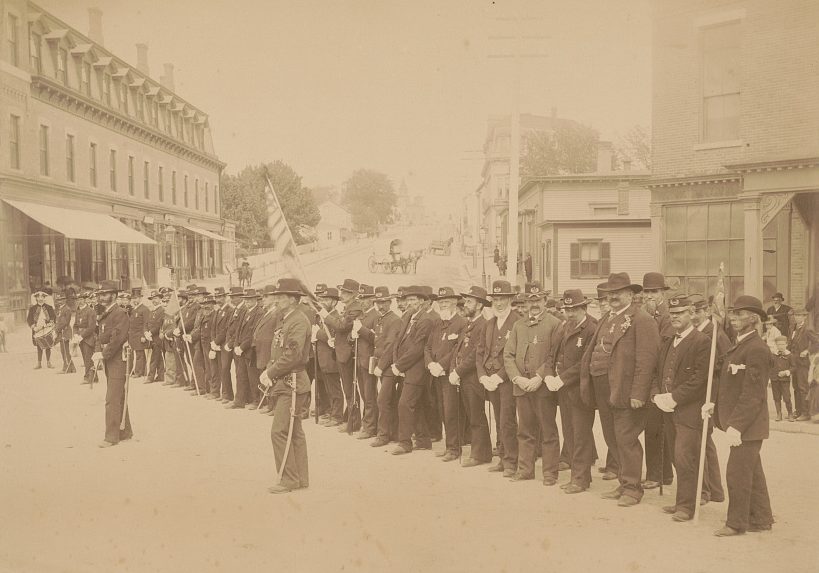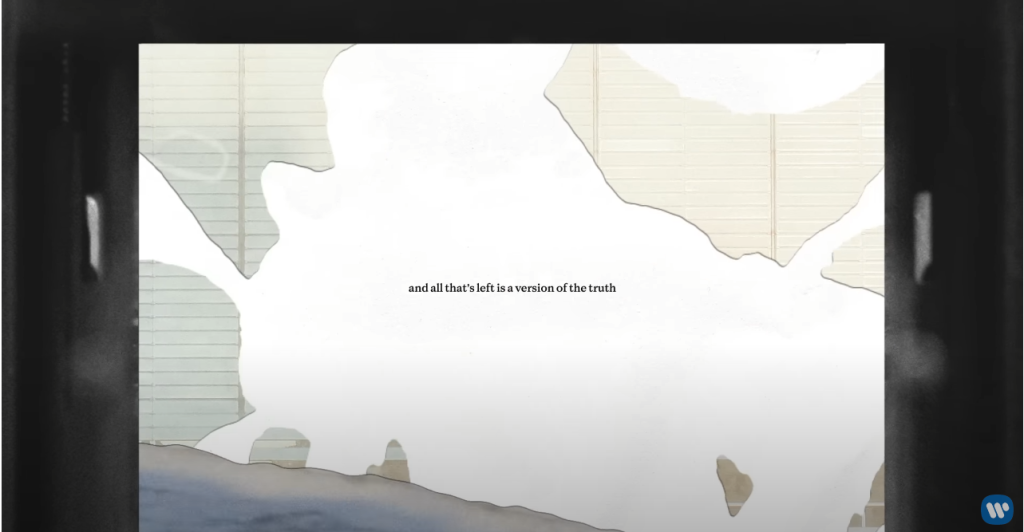“a version of the truth:” Memory and Death Cab for Cutie
While driving, I heard a new song from indie/alternative rock band Death Cab for Cutie. You may be familiar with them from their older work, but what caught my ear was their recently released “Pepper” on the album Asphalt Meadows. The lyrics of the song really struck me. Maybe it’s because I had recently recorded an ECW podcast with Chris Mackowski for our recent book, Civil War Monuments and Memory, or maybe it’s just because I regularly grapple with ideas of memory and history.

Both the book and the song came out the same week in September, so I think that’s a fun coincidence. At the start of the song, a lone voice with acoustic guitar backing begins the first verse:
Take a picture to remember this by
You’ll never hold all the details in your mind
Fillin’ your head with superfluous facts
Pushin’ out what you’re never gettin’ back
And all that’s left is a version of the truth
A recollection that is often misconstrued
sergeant pepper with the faces of friends
but the names all elude you in the end
The second verse continues, following the chorus and the introduction of drums, bass, and a keyboard:
And all that’s left is a version of events
Favorably framed for the sake of self-defense
We barely notice as the pages disappear
Floating off into another year
Though the chorus paints the song as centered on the story of an ending romantic relationship, these words nevertheless apply poignantly to the broader concept of human memory. Just as they describe the feelings and thoughts people have during that experience, it connects to the experiences of Civil War veterans.
The Civil War was traumatic. Combat, the loss of loved ones, and witnessing horrible sights changed people. It’s hard to remember these painful moments; while they may plant themselves permanently in the mind, details are lost. At the same time, the war held touching moments of comradeship, and those burrowed deeply into veterans’ memories too.
When veterans sat down to tell stories of their service, whether in the 1860s or the 1910s, they presented particular images. They spoke at town halls, Grand Army of the Republic meetings, and monument dedications where they talked of lost friends and former glories. In the pages of the National Tribune, a veterans newspaper, they debated the past with each other, presenting the way they remembered battles and often getting in fights with other veterans who claimed otherwise.

As the decades continued on, sometimes these spoken or written accounts not only contradicted other veterans, but occasionally went against simple, accepted historical facts about the realities of the events. Sometimes this added glory to an otherwise bloody or stressful event, and sometimes they were “favorably framed for the sake of self-defense.” When they thought back, they remembered “a version of the truth,” “a recollection that is often misconstrued.” Perhaps the soldiers “barely notice[d] as the pages disappear[ed]… into another year.”
The Civil War generation were, at the end of the day, just people. Their world was different from ours, but they were more similar to us than they were different. This isn’t a criticism of memoirs and veteran writing, as I deeply enjoy reading them and think that viewing them through both lenses of history and memory has a lot to teach us. Just like us, they looked back on the past and occasionally simplified or tinted things with nostalgia. They sometimes remembered events in ways that put them in a positive light. Just like us, they remembered certain things vividly, but maybe forgot some details.

thoughtful essay. very well said. thank you.-
Thank you!
Beautifully presented. “I SEE” said the blind man,” so much more than before”.
Thanks! There’s always a little more to unpack.
Good article.
All historical evidence has to be engaged with critical reflection.
That is to say, we apply rigour, scrutiny and fact-checking to the evidence.
Evidence has value for the reason being such a process ought to have been applied to it.
Thanks. It’s always good to double check the validity of something. There’s value in understanding why someone said something wrong too.
Exactly right; evidence that is flawed/inaccurate, in part or in whole, can still provide useful information/insight/etc, for the historian.
Take for example this letter written by a New Zealander to an associate on 26 March 1865.
https://paperspast.natlib.govt.nz/manuscripts?items_per_page=10&snippet=true&query=Lee%2C+Sherman%2C+America
In it, while mentioning William T. Sherman, the author implies that the North will never prevail as long as Robert E. Lee was in the field.
We know in hindsight this perspective did not mesh accurately into the unfolding of events.
Notwithstanding, what highly useful information DOES this provide the historian with?
That even before the war has ended, Sherman and Lee have forged global reputations! They are the subject of correspondence and discussion of parties far removed from the scene, who eagerly follow news of them!
Critical reflection of history is always benefited by the higher number of questions raised.
Exactly. Take this for instance-
New Zealand National Library Manuscript Series (NZNL MS),
NSNL MS 0032-0635, Sir Donald McLean Papers, Sir George Stoddard Whitmore – Sir Donald McLean, 26 March 1865-
“…I am sorry to say New Zealand does not sound well in the city just now – and the ill luck the Strathallan has had injures our Province…The “City” is in a beastly funk of a war with America. Some think the confederates done for. But I and many military men think that we shall hear of a great defeat inflicted on Sherman in perhaps a few days. Possibly you may get news of it by telegraph. At all events Sherman is pushing forward in a very risky manner through a hostile country and any check may end in a fearful disaster to his Army. The doings of Lee and his subordinates are quite concealed even from the Federals – and Sherman is cut off from communication with his own States. If the Federals meet with any check just now they will be very much depressed for I understand they suffer even more than the Confederates from the necessity of finding new Troops. In their case it is the expence of recruiting…”
*NOTE: This letter can be found on the NZNL webpage.
The sentiments of this historical agent, writing at the contemporary time, are that William T. Sherman is about to suffer a catastrophic military defeat, that the Union is clueless about what Robert E. Lee and the Army of Northern Virginia is planning and what state of condition they are in, (and an implication that Lee is devising something to inflict dire consequences upon the Army of the Potomac), that any defeat suffered by the North at this stage will be devastating for their war effort and that the North is suffering from lack of troops and recruitment potential much more severely than the South.
None of the above is an accurate depiction of events of the war at the time this letter was penned.
To prove the point that you cite, is there anything of value for a CW/WBTS historian in the above source? Absolutely! This letter is proof that even before the war was over, William T. Sherman and Robert E. Lee had forged global reputations and across the world, they were the subject of conversation.
It is important, when reflecting on historical events to put the lives of those being studied into their own prism of introspection and try as best you might to keep your own prism out. A most difficult task at best.
I think its important to avoid using their era’s prism of introspection as a shield to block all modern criticism, but it’s helpful to understand why they thought things.
There’s the fine line between applying a measure of fair and balanced criticism to agents of the past and going too far to legitimate emotional nationalism and presentism.
Anyone of the past can be demonised through uncritical application of contemporary values.
I have personally encountered (and defended!) both Ulysses S. Grant and Dr. King in this regard.
My new favorite blog post!
It’s no War Chicken, but thanks Meg!
ROFLMAO! What size t-shirt do you wear? Seriously–!
“Old men forget: yet all shall be forgot, but he’ll remember with advantages, what feats he did that day!” Henry V, Act IV, Scene III
“This theme of reshaping the memory of war persists beyond the exaggerations of veterans real and imagined; the play argues that remembering with advantages, for good or ill, is the very definition of history.” https://internetshakespeare.uvic.ca/m/doc/H5_GenIntro/section/Remembering%20with%20advantages%3A%20history%20and%20historical%20drama/
Nice GAR pic, too!
Great band. The theme of remembering and forgetting is something Death Cab comes back to a lot in their work. As an example, see “No Room in Frame”:
https://youtu.be/uxTH8GZ4PC4